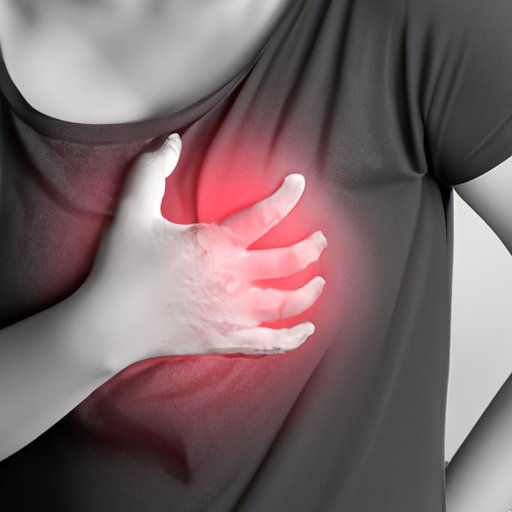
Introduction
Sharp pain under the left breast is a common complaint among individuals, and it can be caused by various factors ranging from indigestion to heart problems. This article aims to provide an overview of the various causes, remedies, and preventative measures to help those experiencing sharp pain. The importance of addressing this issue is also discussed.
Causes and Preventative Measures
Identifying the cause of the pain is crucial in determining the best course of treatment. Some common causes of sharp pain under the left breast include indigestion, gas and bloating, muscle strain, costochondritis, and heart problems.
Indigestion is a common cause of sharp pain and bloating under the left breast. The most effective preventative measure for indigestion is to avoid trigger foods such as spicy or acidic foods. Gas and bloating can also cause sharp pain, and individuals can prevent this by consuming small, frequent meals and avoiding carbonated drinks.
Muscle strain can cause sharp pain under the left breast, especially if the individual has been performing repetitive or strenuous activities. Good warm-up exercises, stretching, and taking breaks during activities can help prevent muscle strain. Costochondritis is inflammation of the cartilage that connects the ribcage, and preventative measures include good posture and avoiding activities that put significant pressure on the chest.
Heart problems can also cause sharp pain under the left breast. Those with a family history of heart disease and risk factors such as high blood pressure, high cholesterol, and obesity should seek preventative measures such as a healthy diet, exercise, and stress management techniques.
Remedies for Immediate Relief
Immediate remedies can help alleviate the sharp pain under the left breast, especially when caused by indigestion, muscle strain, or costochondritis. Over-the-counter pain relievers, such as ibuprofen or acetaminophen, can help reduce inflammation and relieve pain.
Heat or cold therapy can also provide quick relief to those experiencing sharp pain. A heating pad or warm compress can help relax muscles and improve blood flow. Cold therapy, such as an ice pack or cold compress, can help reduce inflammation.
Changing the position can also help alleviate sharp pain. Those experiencing pain may find relief by lying down or sitting up straight. Deep breathing exercises, such as inhaling deeply and exhaling slowly, can also help promote relaxation and reduce stress.
Lifestyle Changes
Lifestyle changes can help prevent future occurrences of sharp pain under the left breast. Stress management techniques, such as meditation or yoga, can help reduce stress and improve overall health. Good sleep habits, such as a consistent sleep schedule and relaxing bedtime routine, can also help prevent sharp pain.
A healthy diet is essential in preventing indigestion and gas and bloating that can cause sharp pain. It is recommended to consume plenty of fiber-rich foods, such as fruits and vegetables, and avoid spicy and acidic foods. Regular exercise can also improve overall health and prevent muscle strain that can cause sharp pain under the left breast.
Importance of Seeking Medical Help
It is crucial to seek medical attention if experiencing sharp pain under the left breast, especially if accompanied by other symptoms. Warning signs that require immediate medical attention include shortness of breath, chest pain, or sudden dizziness.
Ignoring sharp pain under the left breast, especially if experiencing it regularly, can have severe implications on physical and mental health. Seeking medical attention can help diagnose underlying conditions and prevent future occurrences of sharp pain.
Personal Stories
Many people have experienced sharp pain under the left breast, and sharing their experiences can help others cope with the condition. Coping strategies such as taking deep breaths, applying heat, or seeking professional medical help have helped many individuals manage the condition.
Conclusion
In conclusion, sharp pain under the left breast can be caused by various factors and have severe implications on physical and mental health. Preventative measures such as a healthy diet, regular exercise, and stress management techniques can help prevent occurrences of sharp pain. Immediate remedies such as over-the-counter medication, heat or cold therapy, and deep breathing exercises can help alleviate the pain. Seeking medical attention is crucial if experiencing warning signs such as chest pain or shortness of breath. The importance of taking action and seeking professional help is emphasized to prevent severe implications of the condition.




